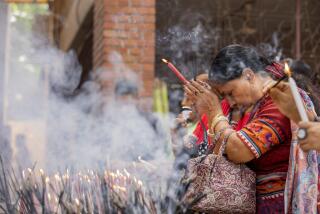Hindus Retaliate for Sikh Attacks : At Least Six Killed in Aftermath of Massacre in Punjab
- Share via
NEW DELHI — At least six people were killed Wednesday as Hindu mobs retaliated against Sikhs for the massacre of 72 Hindus on Monday and Tuesday.
Four of the killings took place in Haryana and two in Uttar Pradesh, adjacent states in the Punjab region of northwest India. Scores of other people were injured.
Incidents of arson, looting and stone-throwing were reported in several towns in the region. Commerce in some places was said to be paralyzed.
It was one of the most serious instances of Hindu backlash since 1984, when 5,000 Sikhs were killed after Prime Minister Indira Gandhi was assassinated by Sikh members of her bodyguard.
Security forces were on the alert Wednesday in the Punjab region and in New Delhi. Authorities prepared for new turmoil in New Delhi, where opposition political parties called for a public protest today.
Call for Harmony
Prime Minister Rajiv Gandhi, who dismissed the Sikh government of Punjab state in May and took direct control, met Wednesday with a group of government and opposition members of Parliament. They issued a joint call for “communal harmony.”
Throughout India there were public condemnations of the terrorist killings of Monday and Tuesday, which involved attacks on buses in the Punjab region. The strongest condemnations came from Sikhs themselves.
Bibi Nirlep Kaur, a Sikh religious and political leader in New Delhi, said in reference to the terrorist killings: “It is no longer just shocking to hear of these incidents. It fills one with a sense of deep grief. This is some sort of madness that has come into our lives.”
Division Among Sikhs
The bitter reaction emphasized what appears to be a growing division of attitudes between Sikhs in the state of Punjab, where they make up a majority, and Sikhs elsewhere in India, where they are a minority. There are more than 8 million Sikhs in Punjab state and about as many scattered across the rest of the country, including a million here in the capital.
Sikhs account for only about 2% of the entire Indian population, but their contribution in many fields--the military, for example--is far out of proportion to their numbers.
They make up more than 20% of the armed forces; more Sikh soldiers have been awarded the highest Indian award for gallantry than any other group.
Sikhs have also distinguished themselves in diplomacy, scholarship, business and politics. The incumbent president, Zail Singh, is a Sikh.
Thus the killing of civilians by Sikhs--believed by the police to be members of a separatist organization that calls itself the Khalistan Commando Force--has been regarded by other Sikhs as an outrage.
Sikh reaction to the killings was stronger Wednesday than on any other occasion in the five years since the terrorists became active in the Punjab region.
‘Most Un-Sikhlike’
“To kill innocent people, including women, is most un-Sikhlike,” said Jeet Malhotra, a Sikh architect who worked with the Swiss architect Le Corbusier on the design for the futuristic city of Chandigarh in Punjab state. “In the name of religion, these terrorists have been trying to put our name in the mud.”
Nirlep Kaur, a member of a prominent Sikh family that runs a construction business that has built many of the most important buildings in New Delhi, said that if the killings continue, they could undermine all the gains made by Sikhs in the decades since Indian independence from Britain in 1947.
“Sikhs are feeling insecure, unsettled,” she said. “They don’t know where they belong now.”
Bakshi Jagdev Singh, a spokesman for Akali Dal, the main Sikh political party, said the attacks had caused “incalculable harm” to the status of Sikhs, and added, “The more (the terrorists) commit such crimes, the more Sikhs will be isolated from the national mainstream.”
G. S. Dhillon, a Sikh and minister of agriculture, said: “These are the acts of a few madmen. They bring shame on the whole community. History will never absolve them.”
More to Read
Sign up for Essential California
The most important California stories and recommendations in your inbox every morning.
You may occasionally receive promotional content from the Los Angeles Times.













